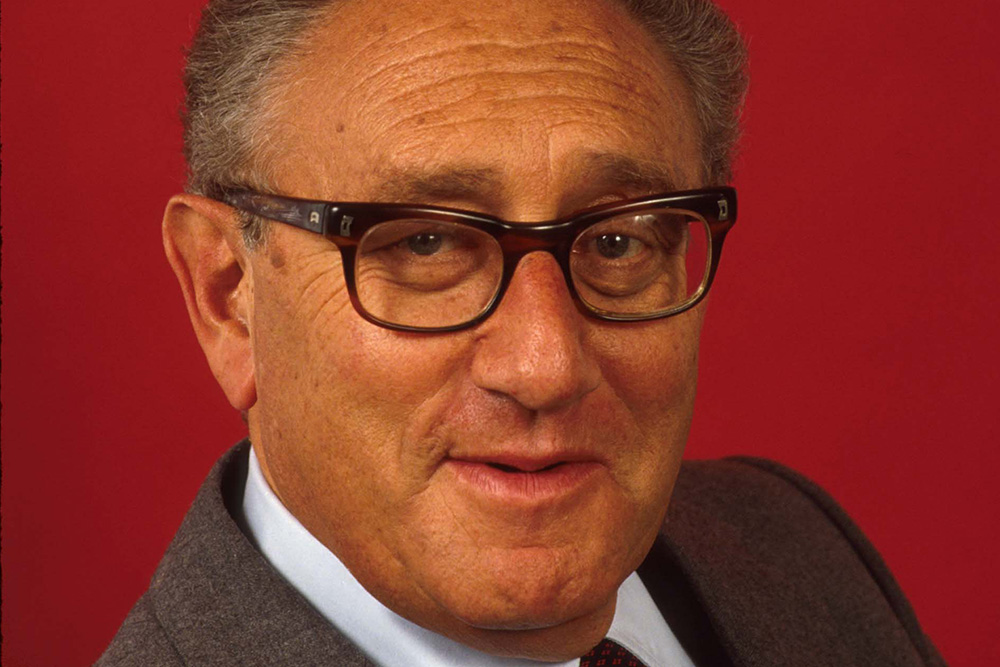By Linnea Crowther November 29, 2023
Henry Kissinger was the U.S. secretary of state under Presidents Richard Nixon (1913–1994) and Gerald Ford (1913–2006).
- Died: November 29, 2023
- Details of death: Died at his home in Connecticut at the age of 100.
Kissinger’s legacy
Kissinger leaves behind a complicated legacy as a complex figure in U.S. politics and foreign policy. Hailed by some as the greatest secretary of state of the modern era, he was accused of war crimes by others. His negotiations during the Vietnam War earned him the Nobel Peace Prize, but it was one of the most contentious Peace Prize announcements in the award’s history. He was a hero to some, a villain to others.
Early life and career
Born in Germany, Kissinger fled the Nazi regime with his family and came to the U.S. Kissinger attended Harvard University, receiving his undergraduate degree as well as a master’s and a doctorate. After completing his education, he became a faculty member in the Department of Government and began setting the stage for his political career by writing several books on foreign policy. The first, 1957’s “Nuclear Weapons and Foreign Policy,” took on President Dwight D. Eisenhower’s (1890–1969) Cold War policies.
Kissinger wanted to be involved in our national foreign policy, and he soon got his foot in the door, serving as a special adviser on foreign policy to Presidents John F. Kennedy (1917–1963) and Lyndon B. Johnson (1908–1973) while he continued to teach at Harvard. In 1969, he left academia when Nixon appointed him national security advisor, a position he held until 1975.
National security advisor
As national security advisor, Kissinger became a major player in Cold War strategy, introducing the policy of détente between the U.S. and the Soviet Union. Through détente, the two superpowers sought to relax the tensions between them, opening lines of communication and signing treaties – though both remained prepared for thermonuclear war. As he worked on détente, Kissinger also entered into negotiations with China, ending a period of hostility in favor of an alliance against the Soviet Union.
Nobel Peace Prize
It was Kissinger’s work on ending the Vietnam War that would win him a hotly contested Nobel Peace Prize. Nixon sought to end U.S. involvement in the war, and while that did eventually happen, it was a years-long process that included Kissinger’s policy of bombing Cambodia to disrupt the Viet Cong. Already undergoing its own civil war, Cambodia lost many thousands of civilians to U.S. bombs – estimates vary from 4,000 to 150,000 – yet some argued that despite the collateral damage, the bombings were effective in their intent.
In early 1973, Kissinger was a key player in the negotiations that led to the Paris Peace Accords, ending direct U.S. military combat in Vietnam and bringing the war closer to its end. It was this negotiation that brought Kissinger the 1973 Nobel Peace Prize, shared with fellow negotiator Le Duc Tho of Vietnam. However, Tho refused to accept the award, insisting that peace had not been restored, and two members of the Nobel Committee resigned in protest of the award. It would become perhaps the most controversial prize in Nobel history, with critics noting Kissinger’s bombing campaigns as the exact opposite of peaceful. For his part, Kissinger accepted the award “with humility,” as he said in his acceptance speech.
Secretary of state
In the same year Kissinger negotiated the Paris Peace Accords and won the Nobel Peace Prize, he became the 56th U.S. secretary of state, appointed by Nixon. He would continue as national security adviser for two more years and remain in his secretary of state post until 1977, serving for the duration of both Nixon’s and Ford’s administrations.
Kissinger had a hand in negotiations around the world during his term, including another highly contentious situation in Chile, where the U.S. worked to oust President Salvador Allende. A similar situation arose in Argentina, where President Isabel Peron was ousted. Other areas in which Kissinger had a hand as secretary of state included Cuba and Rhodesia.
Later career
After leaving office, Kissinger founded the consulting firm Kissinger Associates. He was controversially offered an endowed chair at Columbia University in 1977, but strong student opposition led to the offer’s withdrawal. He returned to a writing career that was on hold while he was in public office, penning a number of books over the years on subjects including his experiences in Vietnam and China, the history of diplomacy in the 20th century, and the evolution of U.S. foreign policy.
Kissinger remained in the news off and on throughout his life, commenting on world events including the Iraq War, which he supported; the Arab Spring; and the 2014 Ukrainian crisis. His support was a point of contention during the 2016 presidential election primary season, when former U.S. Secretary of State Hillary Clinton called him a friend and source of counsel, while her Democratic primary opponent, U.S. Sen. Bernie Sanders of Vermont, criticized Kissinger’s approach to foreign policy.
Kissinger on foreign policy
“A country that demands moral perfection in its foreign policy will achieve neither perfection nor security.” —from 1994 article “Reflections on Containment”





